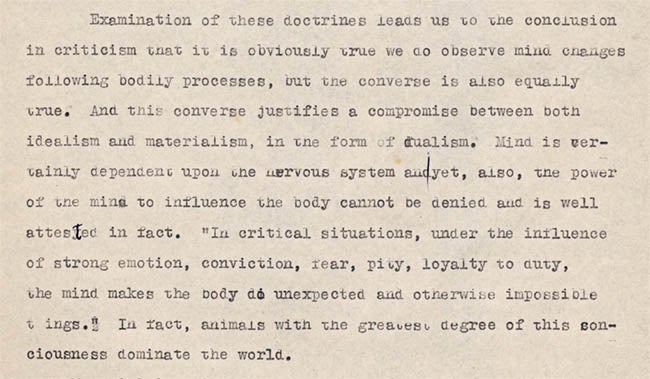The Dartmouth Dualist
Special note: This blog post was written by Edward Reges, M.A. ‘16, East Carolina University Department of English, as part of a special series highlighting the Stuart Wright Collection.
Richard Eberhart, Pulitzer Prize recipient and Poet Laureate of the United States from 1959 – 1961, is recognized as a dualistic poet; his poetry often featured two extremes in harmony, be they life and death or will and psyche. It is quite possible that the early days of his college career at Dartmouth College offered Eberhart a foundation for his understanding of the world and his creative identity. The Stuart Wright collection at Joyner Library has thirty eight boxes of Eberhart material, from poems and proofs to naval papers, calendars, photographs, and audio recordings.
Eberhart described philosophy as the “sum total of human knowledge as an outcome of the interpretation of the universe in one’s mind” in a paper written for his introduction to philosophy course in the spring semester of 1924. Stuart Wright obtained this paper and several others a young Eberhart wrote for this course. These papers depict a young man coming to terms with how he interprets the universe, and coincidentally, how he expresses himself. I have pulled from three of these papers, one on each of the prominent philosophical theories of mind, to demonstrate Eberhart’s reasoning.
The popular philosophy of mind in the 1920s, when Eberhart was a student at Dartmouth, was likely idealism. Put bluntly, idealism is the philosophy that everything we are and experience is an idea. Idealism is often seen as a dreamy outlook, and Eberhart seems to agree: “Intuition is a dream; thought must be the dream of that dream” (5).
Materialism, however, is the polar opposite of idealism. Backed by the consistency of science and observation, this theory claims that not only are the objects located in the external world that cause our experiences physical, but also our thought processes, experiences, and awareness are physical byproducts of a functioning nervous system. Eberhart refutes this theory by identifying ethically questionable motives for materialism: to break tradition and to control the external world. In his words, materialism focuses on “mental emancipation from the super-situation and false credulity of unproven gods and practice because it arises out of a desire to control the external world” (1). Eberhart dismissed materialism in part because he disliked its determinism, and believed instead that free will was the underlying principle of the physical form (Karthikeyan & Dwivedi, 226).
Eberhart combines his understanding of idealism and materialism to come to a conclusion in a third paper on substance dualism: the idea that reality consists of both physical and mental substances. The following excerpt from page 3 of his paper on dualism explains his position:

Eberhart, Richard. Materialist Philosophy. 1924. Stuart Wright Collection. J. Y. Joyner Library, East Carolina University, Greenville, N.C.
This dedication to a dualistic philosophy shows through in Eberhart’s works. As Karthikeyan and Dwivedi point out in their article “Richard Eberhart’s Poetic Theory: Art and Craft,” the poet believed that poetry is divided into an art and a craft, and used his craft to contribute to the art under the pretense that minds were divided into the physical will and the mental psyche. Karthikeyan and Dwivedi, on page 226, assert that Eberhart’s “psyche poetry pertains to the soul, to peace, quiet tranquility, serenity, harmony, stillness and silence. It provides psychic states of passive pleasure,” while “will poetry exists because of the power in the cell beyond its energy to maintain itself, ‘will’ results in action through zeal, volition, passion, determination, choice and command.”
It is a rare opportunity to see the reasoning behind a poet’s style and works. The Stuart Wright Collection in the Joyner Library offers explanations and personal correspondence that cannot be obtained with a Google search. For those interested, more items in the Eberhart papers, including a hand-inked autobiography of his early life and his philosophical analyses of Shakespearean literature, can be found in the Stuart Wright Collection Finding Aids, along with a short biography of his very interesting life.